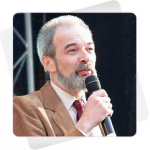
Look, It Is Even Moving!
(Some notes of Master-Jam Fest that started in 2013)
Once Einstein was asked about the process of making a discovery.
«It is really simple. Everybody knows that it is impossible to make a discovery. There is always an ignorant man who does not know it. He is the one to make a discovery,» replied the scientist.
The Odessa jazz Master-Jam Fest is quite unusual. It has а weird format and it goes beyond the limits. Since the project was born it has been impressing people globally and has become international in reality. The final part of the festival took place in the beginning of June and had such success nobody seemed to be expecting. The experiment made by the project author and producer Mikhail Freidlin and his team looked unreal from the very beginning. Even the author himself thinking over the project for more 10 years was skeptical about the reality of the idea embodiment. Being a big fan of jazz and jam session format he dreamed of creating the global jam that could be a certain ground for a musical contest. The main idea of this experiment is that the participants placed in rather extraordinary contest conditions have to unite their thoughts and feelings with little known partners and create a piece of art in a very short time. This process is a bit framed by stylistic boundaries and a time limit for public performance of the musical pieces.
The first test flight has been accomplished. I have not seen such extraordinary joy and have not experienced such feeling of unity with the people surrounding me for a long time. That feeling was in the air on the festival days not only in the auditorium but also out in the streets near the Russian Academic Theatre, follow-up stories, photographs and internet postings shared with friends, that united the public and the musicians. That was exactly what the concert managers tend to strive for and that has not happened for a long time during such festivals. This unity does not come about due to different reasons and I would like to note down the two of them. Those who follow global jazz tendencies do not quite believe that here, at home (in Russia or Ukraine), they can eyewitness jazz concerts of the world level, especially with participation of the local musicians. Internet sources, recordings, and personal experience of those attending the festivals abroad are a solid ground for such disbelief. As for more groundling wider audience there is enough show supply for the demand. This statement is true for standard festivals and, especially, for the series of show programs ‘About Jazz’ on one of the Russian channels that claims to reflect ’cultural processes’. I think that most of these actions are a far cry from the true jazz.
That snobbish attitude was totally demolished in Odessa. The effect of that festival-contest turned out to be quite unexpected. Creative efficiency of the participants grew up to the level that rarely eventuates at the standard festivals. The Master-Jam mechanism managed to create an artistic environment in which many musicians opened up in an unexpected way. The most important thing in the festival was not the TV picture, rating or embodiment of TV producers’ illiteracy, but just music. The music was not only born right there but also revealed hidden abilities of the ensembles made up by the lottery. The music also revealed a number of striking musical heroes that were talked about, are being talked about and will be talked about for a long time. The music made the audience stand up in unanimous delight together with the visibly calm but also emotional jury.
Let us talk about these concepts in detail. The idea of the festival-contest conceived 10 years ago did not fit the framework concept of a standard festival. A standard festival is a showcase event, a face of contemporary (or not contemporary, depending on preferences of organizers) jazz. It is a parade of ensembles from different countries that is held simultaneously on several venues within several days (sometimes within quite a number of days), building up the festival infrastructure including hotels, meals, festival merchandise, and etc. It is compulsory to have one or two headliners who attract the audience. Thus, on one hand, it is a big jazz shop window where a «jazz product» is displayed. A ready-made jazz ‘product’ was not present in the Master Jam Fest concept. That ‘product’ was supposed to be made during the festival days. What if the ‘product’ failed to be made? It was quite a risky enterprise. On the other hand, it is a contest in which the musicians have to be assessed by a certain jury. Jazz is a system of permanently generating, sparkling personalities. The participants are not sportsmen and women competing in a number of goals hit or record seconds and meters made. They are not academic musicians or dancers who can be assessed according to the academic school criteria. A jazz musician has the right to ignore the ’school’ (there are examples among the well-recognized jazz coryphées). How can you assess such musicians and weigh? How can you attract the audience to see all this, as the audience wants to see a good show for their money at the end of the day? ...
All these issues did not bother a well-known theoretician in economics, a jazz fan and a long-term producer of the Odessa Jazz Carnival, a Moscow Odessite Mikhail Freidlin. They did not bother him to the point that having obtained a patent for the idea and a supposed working mechanism of his dream, having put together a small team of assistants and having obtained some formal support of some jazz authorities (formal as these people did not quite believe in success of that enterprise), he pushed the start button on that mechanism in 2012.
The online Internet round lasted for almost a year with an aim of shortlisting the best musicians so that they could come to Odessa for the final live session. There were more than two hundred and seventy audiovisual applications from the musicians of 41 countries. The special expert committee and the public listened to the recordings and watched the videos. Every step and stage of the MJF was reported to the Internet community in detail so it was almost impossible to stay away from the process. Such things as changing ratings of the participants, events inside the festival process that was 9 months long, accompanying events (concerts, jubilees, exhibitions) created certain tension culmination of which was supposed to take place in Odessa in the beginning of June. By that time the ‘festival village’, off the contest concerts, workshops and exhibitions had been ready for the participating musicians and the jury members coming from different countries geography of which ranged from Cuba to Indonesia, in total there were 16 countries. On the very first day, to be more exact, in the very first evening, the Master-Jam Fest mechanism defined by Mikhail Freidlin as a «know-how» was started. Five representatives of eight main instruments and one exotic, additional instrument (in that case they were a flute, a darbuka and a harp (harmonica)) had to form five ensembles according to the lottery results, meet the next day in the practice session hall, get acquainted and rehearse their programs made out of three themes (two of different jazz stylistics and one original composition) to perform them the same evening in the concert hall. Each program had to be only 30 minutes long during the concert. To accomplish all above — mentioned the participants had only about one and a half hours of a practice time in the morning. On top of that the participants had to rehearse the joint big band program for the final Gala concert. After the evening concert the participants would have a new lottery and a new cycle began. There were three contest days of the festival and the three cycles as described above. The forth day was not easier. It consisted of a rehearsal and a joint big band program in the first part of the Gala concert, where the jury members seemed to enter the contest too, the contest of conductors. Anatoly Kroll from Moscow (Russia), Nicolay Goloshchapov from Odessa (Ukraine) and Andrew Machnev from Rostov-na-Donu (Russia) presented their programs with a joint big band made out of the festival participants. The second part of the gala concert consisted of the performance of the laureate ensemble. The laureate participants had only 15-20 minutes of the intermission to agree about the compositions they were going to play right away. I think that after all those challenges these 43 musicians could further succeed in their career, for example, as members of an astronaut team.
I am not going to describe the way the musicians performed or the heroes of each day as there is a lot of written material about it and videos of all concerts can be watched in the Internet (by the way, online video broadcast also took place). I just want to make some notes. The first impression of the first night was the following: a bit skeptical jury was pleasantly surprised seeing almost a full house. There was not a single ‘jazz star’ headliner on the MJF posters; how come there were so many people? That ‘almost’ disappeared completely the following days. The word of mouth marketing had worked well; the auditorium was getting full, extra tickets were asked for in the neighboring streets on the final day. One more shocking thing was a surprisingly high standard of performance. Of course, it is understandable that the musicians differed in their experience, talent, a sense of form and style, instrumentalism, musicality and artistic taste. However, there were no poor musicians who were not ready for such a challenge. It was interesting to observe how the level of performance of some musicians was changing as they were adapting to the new musical conditions. That is exactly what happened to the trumpeter from Belarus Andrew Zyl. The performance of the Greek guitarist George Stavroulakis and Odessan pianist Aleksey Petukhovbecame the fine examples of gradual revealing of their abilities as musicians. The participants of the festival were musicians with substantially different experience (there are no age limits in the contest) and as a result some of them turned out to be the real leaders undertaking the functions of conductors in their ensembles. Here I am talking first of all about an American saxophonist Hernan Jay Rodriguez and a Cuban pianist Alexis Bosch. It is also interesting to note some transformation in attitude of the public to some musicians. An Afro-American musician from Denmark Gregory Boyd was nominated as a vocalist and was not quite understood as a singer at first, later on he showed a certain virtuosity playing the steel pan, an instrument, little known to the wider audience in this hemisphere, on the last day of the festival he started singing in such a way that the audience jumped up on their feet and did not get back to the sitting position for a long time. It was a hurricane of musicality, sound and mood mastering.
The contest revealed a number of musicians, by the way the young ones that brought even experienced members of jury into a certain state of uncontrolled exaltation. In my opinion the first place here belongs to a vocalist from Odessa Tamara Lukasheva, currently living in Germany, where she continues her studies, and a magnificent Cuban drummer Yissi Garcia. As for the jazz vocal there are certain problems with this style of singing in this part of the world. Tamara Lukasheva revealing excellent abilities in singing in different styles from the swing to the contemporary original music, in different genres from the ballad to the coolest rhythm and blues and showed that the future of our vocal looks rather optimistic. And, at the end of the day, I cannot but say about an absolutely fantastic 9 year-old boy Joey Alexander Sila from Indonesia who created a furor and deserved the Grand Prix obtained by him. Nobody understood how come that a child felt absolutely free in the whole set of styles, was fluent with a keyboard and addressed the musical offers of the ensemble partners, who were a bit shocked with the boy’s reaction, with great humor. How come that staying alone on stage a boy improvised in a quite difficult ballad, improvised thoughtfully and intensely, as if he had already had 70-year experience of his guide in music Herbie Hancock and read attentively a couple of volumes by Feodor Dostoyevsky.
Surely, the First contest had a number of small drawbacks, as life is life. There was a certain mess in setting up the styles to be performed by the musicians as sometimes instead of a style a genre was assigned. The musicians, however, did not fuss and drifted away from these assignments, the jury did not pay a lot of attention there as well. There were some problems with allocation of the instruments on the stage and, correspondingly, with sounding; there were little problems with timing and the concert hosting. All these are small things that are easy to amend.
However, it is impossible to amend the main thing: a new, unique and having no counterparts form of jazz communication between musicians and the public was born in Odessa. The form obtained high score right away. That was a visible success. That success needs to be developed and prolonged so that it could leave the boundaries of Odessa, Ukraine and move out to the world. It is possible that the organizers were just lucky the first time to get the talented participants who were ready to risk and sacrifice to reach the goal. It is also possible that the success resulted from that very new approach to the form of jazz action being fostered for so many years. Let us see and not only see into that but also let us do our best to turn this mechanism into the ‘perpetuum mobile’ that never stops.
Mikhail Mitropolsky
Translated into English by A. Kuznetsova
ABOUT THE AUTHOR:
Mikhail Mitropolsky — jazz commentator, TV and radio presenter. Member of Moscow and International Jazz Journalists’ Association (JJA). For about 40 years he has been researching jazz music and phenomena conterminous with music. By education he is a physicist, a scientific associate of the Physics Institute of RAS. Since 1978 he has been giving lectures about history and stylistics of jazz in Moscow College of music improvisation. Since the same time he has led many concerts and jazz music festivals in different cities of Russia, Ukraine, Belarus, Moldova, Lithuania.
Since 1989 he has been an author of broadcasts on the various Moscow radio stations: «Mayak» («Beacon»), «Yunost» («Youth»), «Vozrogdeniye» («Renaissance»), «Radio 101», «Otkrytoye radio» (Open Radio)’, radio program ‘’Solo for Jazz’’ on the radio «Nadegda» («Hope») and «Govorit Moskva» («Moscow broadcasts»), since 1999 till now he has been leading a program ‘’Eternal approach’’ on the «Radio Rossii», that breaks a strict connection between interspecific music partitions, including jazz, under the slogan ‘’search for the truth’’, also a daily heading «Mikhail Mitropolsky musical occasion». For several years he was a creator of the weekly program «Jazz i ne tolko» («Jazz and more») on the TV-channel ACT and ‘’Rambler TV-network’’. His jazz-reviews was published in the magazines «Jazz.Ru», ‘’Jazz-square’’, ‘‘Yat’’, and ‘’XXL’’, in the newspapers «Nezavisimaya» («Independant»), «Vecherniy klub» («Night Club»), www.jazz.ru etc. Since 1990 for 3 years he was running the publishing company DIALOG-MUSIC. Hе is the author and creative director of the project of Moscow International music house ‘’European jazz-XXI century’’.
In 1998 Mikhail took part in the creation of the special music project ‘’Vtoroe priblizheniye’’ («Second approach», leader Andrey Razin), that combines method of improvisation with profound compositional approach. Mitropolsky continues work on this project, one the several Russian ensembles, that presents not a routine but an original way of jazz and improvisation music development on the domestic and European stage. Since 2007 he has been leading a concert cycle «New Age Improvisation» in Jewish cultural center in Moscow.
The jury member of «Master-Jam Fest 2013» the First International Festival-Contest of Jazz Improvisation.

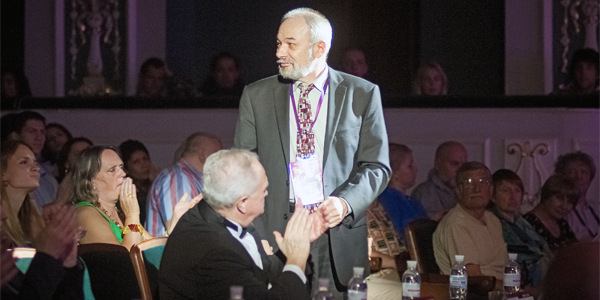
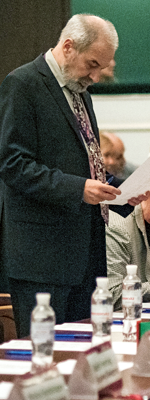



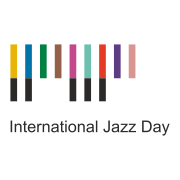
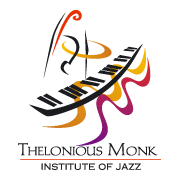
We would be grateful for your feedback!